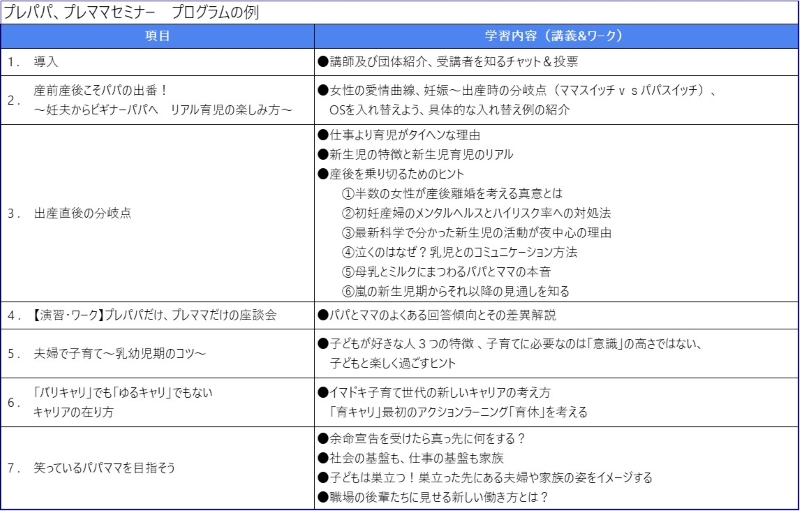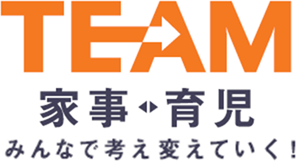
Manabu Tsukagoshi (Director, NPO Fathering Japan)
Have you ever heard of the “Corporate Parents Class? We asked Manabu Tsukagoshi, director of Fathering Japan, a non-profit organization that has been supporting fathers for more than 15 years and also serves as an instructor for the “Corporate Parents Class,” about the significance of companies holding parent-teacher training programs. We asked him about the significance of corporate parent-teacher training.
What is the “Corporate Parents’ Class”? Difference from “Parents’ Class” sponsored by local governments
Parents’ classes are learning opportunities held by local governments, maternity hospitals, and companies for people who will have children in the future.
In general, midwives and public health nurses serve as instructors at “parents’ classes” held by local governments and maternity hospitals, where participants learn about physical changes during pregnancy, knowledge about childbirth, bathing, diaper changing, and other topics related to pregnancy, childbirth, and childcare immediately after birth.
On the other hand, “corporate versions of parenting classes” are held by companies for their employees, and an increasing number of companies are now allowing spouses to participate as well. Businesspersons often serve as instructors, and participants mainly learn about systems and methods for balancing work and childcare, as well as the importance of having a career and raising children in cooperation with one’s spouse.
Both the “Parents’ Class” and the “Corporate Parents’ Class” are important learning opportunities for parents to become parents.
Comparison of the characteristics of the “Parents’ Class” and the “Corporate Parents’ Class
| parents’ class | Corporate Version of Parents’ Class | |
| organizer | Held by municipalities and maternity hospitals | Held by companies for employees and their spouses |
| lecturer | Mainly midwives and public health nurses | Mainly business people with child-rearing experience |
| Main contents | Tips and tricks for pregnancy, childbirth, and newborn care | Balancing work and childcare, the content and use of systems for balancing work and childcare, how childcare and careers should be, and the importance of cooperation with one’s spouse. |
Let’s build a cooperative relationship between husband and wife during the most important postpartum period when the “child-rearing brain” is formed.
The content of the “Corporate Version of Parents Class” varies depending on the needs of the company hosting the class. I vary the length of time and learning content to suit the company and the demographics of the participants, but as an example, the following program is used to facilitate the lectures.

We explain the changes in women before and after childbirth and why raising a newborn is more difficult than work, we tell them about the structure that they and those around them assume that “raising a child is something mothers do,” and we give advice on how to work before and after childcare and how a couple’s careers should be.
It is said that “the crisis of a couple is in the postpartum period.” If only the mother’s child-rearing skills increase rapidly after giving birth at home, it is difficult to make up the difference in the angle of growth. As a result, the burden on mothers increases and they are unable to balance work and family life.
Women do not become “mothers” immediately after giving birth to a child. Biological studies have shown that the experience of raising a child for a few months after birth changes the brain, deepens the love for the child, and improves the ability to care for the child.
If men experience the same thing in the immediate postpartum period, the same changes will occur in their brains. For this reason, I especially recommend that fathers take “postnatal parental leave” (childcare leave at birth). During the most important postpartum period, when the “child-rearing brain” is formed, the first step toward building an ideal cooperative relationship is for the father and mother to stand at the same starting line and experience child-rearing together, so that they can grow at the same angle.
Learning Opportunities Provide Opportunity to Change Men’s Attitudes and Eliminate the Problem of “Take-it-Only Maternity Leave”.
The revision of the Child Care and Family Care Leave Law in 2022 obliges companies to promote male childcare. The new “postnatal father childcare leave (childcare leave at birth)” is expected to further increase male participation in childcare. At the same time, however, the problem of “take-it-only childcare leave,” in which men take little or no childcare during their child-rearing duties, has come under close scrutiny. The reason for this is that there have been few opportunities for men to learn about housework and childcare, and they do not understand why it is important for them to take childcare leave. By taking the “Corporate Parents Class,” men can learn the purpose and timing of taking childcare leave and how to spend their time during childcare leave, and the problem of “take only childcare leave” can be solved.
In addition, many male employees may have reported the birth of their children to the company after they were born. By introducing a “corporate version of parent-teacher classes” and making attendance mandatory, companies will be able to catch information on male employees’ spouses’ pregnancies earlier, and will be able to know the timing of childcare earlier, making it easier to plan for work distribution and personnel.

The rate of acquisition of childcare services has increased! Positive feedback from participants
Some companies held a “corporate version of parents’ class” and achieved results, such as an increase in the percentage of men taking childcare work from approximately 40% before the class to approximately 60%. In a survey of participants, there were comments such as “I realized how little awareness I had as a father about childcare,” “There were many things that I understood and reflected on as I looked back on my childcare chores, such as the difference in what fathers and mothers want,” and “The fact that the husband’s taking childcare leave during the newborn period changes the couple relationship afterwards was a very interesting topic,” “The husband’s taking childcare leave during his newborn period changed the couple relationship afterwards. I was able to see childcare as a part of my career,” “I was able to gain a perspective that childcare itself builds work skills and strengthens the team,” and many other positive comments.
Fostering an atmosphere in which men are more likely to engage in childcare and improve their work styles.
The biggest change in this amendment to the law is that companies must individually confirm the willingness of employees, regardless of gender, to take maternity leave for any employee who requests it. The most significant change in the new law is that companies must now ask each employee, regardless of gender, “What do you want to do about maternity leave? However, in the case of male employees in particular, there are many cases in which it is difficult for them to say so for reasons such as inconvenience to the workplace, and the Tokyo Metropolitan Government’s “Survey on Men’s Housework and Childcare” (*link) reveals this situation. I tell managers and managers to reflect on the fact that they have created a workplace where it is difficult for men to express their desire for childcare leave until the very last minute,” I say in management training sessions. I am also often asked by human resource managers of companies that have had difficulty in promoting male childcare, “What can I do to change the atmosphere in the workplace?” I am sometimes asked.
The “corporate version of parents’ classes” is an effective solution to this problem. By taking the initiative in holding these classes, companies can reassure their employees that “our company supports child-rearing” and foster an atmosphere conducive to child-rearing. In addition, group work and free discussions in the course will allow employees who will become parents to talk with each other from the same standpoint, which will relieve their anxiety and create a network of the child-rearing generation within the company, making it easier to share information.
In addition, employees who have experienced childcare work are more likely to think about improving their work efficiency in order to achieve a good balance between childcare and work, which can lead to improvements in their work styles.
Small, medium, and micro companies can also hold the event with a little ingenuity. Let’s take a step forward with top leadership!
Although the “corporate version of parents’ class” has many advantages for both the company and its employees, it may be difficult for small, medium, and micro companies to hold such a class because not many of their employees have children every year. For example, one idea would be to ask business partners to jointly hold such classes, or to have a local business association or industry group serve as the organizer and invite companies to participate. The more companies that agree, the less burden each company will have to bear and the budget problem can be solved. Rather than giving up and saying, “We can’t do it,” managers should take the initiative and make the first step.










